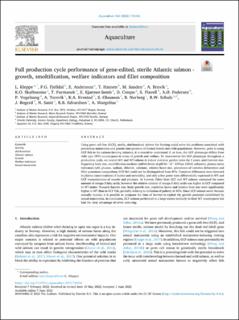Full production cycle performance of gene-edited, sterile Atlantic salmon - growth, smoltification, welfare indicators and fillet composition
Kleppe, Lene; Fjelldal, Per Gunnar; Andersson, Eva; Hansen, Tom Johnny; Sanden, Monica; Bruvik, Aina; Skaftnesmo, Kai Ove; Furmanek, Tomasz; Kjærner-Semb, Erik Nordtorp; Crespo, Diego; Flavell, Simon; Pedersen, Audun Østby; Vogelsang, Petra; Torsvik, Anja; Kvestad, Karen Anita; Olausson, Sara; Norberg, Birgitta; Schulz, Rüdiger W.; Bogerd, J.; Santi, N.; Edvardsen, Rolf Brudvik; Wargelius, Anna
Peer reviewed, Journal article
Published version
Date
2022Metadata
Show full item recordCollections
- Articles [3011]
- Publikasjoner fra CRIStin [3061]
Abstract
Using germ cell-free (GCF), sterile, dnd-knockout salmon for farming could solve the problems associated with precocious maturation and genetic introgression of farmed breeds into wild populations. However, prior to using GCF fish in the salmon farming industry, it is crucial to understand if, or how, the GCF phenotype differs from wild type (WT) counterparts in terms of growth and welfare. To characterize the GCF phenotype throughout a production cycle, we reared GCF and WT salmon in indoor common garden tanks for 3 years, until harvest size. Regarding body size, smoltification markers (mRNA levels of gill Na+/K+-ATPase [NKA] subunits), plasma stress indicators (pH, glucose, sodium, chloride, calcium), relative heart size, prevalence of vertebra deformities and fillet proximate composition, GCF fish could not be distinguished from WTs. Transient differences were detected in plasma concentrations of lactate and osmolality, and only a few genes were differentially expressed in WT and GCF transcriptomes of muscle and pituitary. At harvest, fillets from GCF and WT salmon contained the same amount of omega-3 fatty acids, however the relative content of omega-3 fatty acids was higher in GCF compared to WT males. Towards harvest size, body growth rate, condition factor and relative liver size were significantly higher in WT than in GCF fish, probably relating to initiation of puberty in WTs. Since GCF salmon never become sexually mature, it is possible to postpone the time of harvest to exploit the growth potential uninhibited by sexual maturation. In conclusion, GCF salmon performed to a large extent similarly to their WT counterparts but had the clear advantage of never maturing.
